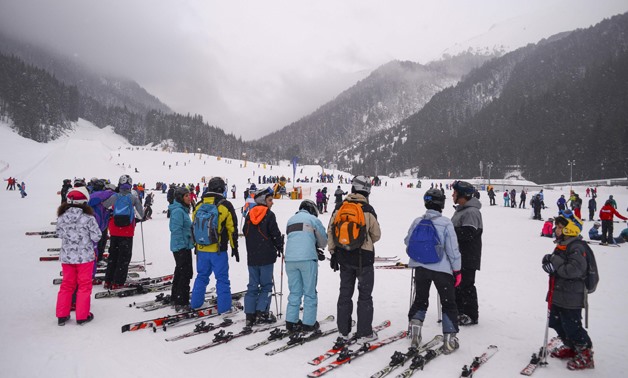
People wait at the Banderishka polyana ski resort on February 10, 2017 near Bansko.- AFP / NIKOLAY DOYCHINOV
BANSKO (Bulgaria) - 8 March 2018: “Unlimited Ski and Fun!” promises a pamphlet touting the Bansko ski resort, a magnet for bargain-hunting holidaymakers in southwest Bulgaria.
But nature lovers are demanding limits to the growth of the bustling resort carved into the majestic pine forests of Pirin National Park, a Unesco World Heritage site since 1983.
The clearance of more than 160 hectares of centuries-old forest to build the ski zone already prompted Unesco in 2010 to remove the area from the World Heritage designation, labelling it a “buffer zone”.
Now a much larger area could come under threat after a government decision in December opened 48 per cent of the park’s 40,000 hectares for construction, sparking weekly protests attended by thousands across the country.
Protestors accuse the government of favouring business interests in a country ranked by watchdog Transparency International as the EU’s most graft-prone, with one huge banner at a recent rally in the capital Sofia reading: “Corruption! Save Pirin”.
But the resort is the area’s biggest employer and locals have responded with their own demonstrations in favour of expansion.
At issue in particular is a plan to build a second ski lift to ease persistent queues at the sole six-person lift, which currently takes 2,200 skiers per hour up to the 75 kilometres of runs.
‘Horrific’ queue
British holidaymaker Carolyn Bennett, 30, is among the skiers who come in droves to Bansko from Britain, Russia and Bulgaria’s Balkan neighbours, attracted by the cheap food and lift passes as well as budget flights.
But even on a supposedly quiet day, she was among scores of people at the foot of the ski lift, where queues form from early morning and waits can last up to three hours.
“Another gondola is going to have a huge impact environmentally but I imagine coming here in peak season, that queue would probably be horrific,” she shrugged in the crammed gondola cabin.
“With a daily lift pass costing €28 (RM136), Bansko is the cheapest resort of its capacity in Europe, and even if our queues have become notorious, people keep pouring in,” Bansko’s marketing chief Ivan Obreykov told AFP.
Daily lift passes at ski resorts in France and Austria typically cost twice as much.
Bansko hosts some 35,000 to 40,000 visitors per month during the winter season. On a busy day, up to 7,000 people could hit the ski lift at the same time in the mornings.
Booming construction in the once quiet town of 9,500 inhabitants has seen its two-storey houses and cobbled streets surrounded by hotels and luxury apartments with space for 18,000 guests.
While ugly concrete skeletons of a number of hotel projects abandoned after the 2008 financial crisis mar the landscape, pressure is mounting to expand both the town and the ski zone.
Trojan horse claim
Obreykov praised the government’s green light for the second ski lift, adding that its construction was the resort’s “first and most pressing task”.
But those opposed to the plan say it is a Trojan horse to cover up previous unauthorised building and encourage even more expansion.
“If they wanted to do just a second gondola, they would not have opened almost half of the territory of Pirin National Park for construction,” WWF’s Konstantin Ivanov said at a rally in Sofia.
“We don’t buy their promises that nothing more will be built there,” he added.
WWF claims the ski zone has already grown to cover 60 percent more territory than initially agreed and points to as yet unapproved plans for huge expansion of the resort.
Obreykov denied the charge, adding that new ski runs could be built only within the current area of the ski zone.
A recent study for the WWF concluded that the resort has already inflicted “irreparable damage” on the reserve, calling for Unesco to inscribe Pirin on its List of World Heritage in Danger if new construction begins.
A report by the International Union for Conservation of Nature (IUCN) in November also said the conservation outlook for Pirin National Park — home to bears, chamois and wolves — was of “significant concern” and just one step away from the final “critical” stage.
IUCN also underlined the “threats of disturbance and fragmentation of the site associated with the exclusion of the skiing areas as incompatible with its World Heritage status.”
‘Deepening mistrust’
For economist Petar Ganev, of the Sofia-based Institute for Market Economics, the row is an example of “deepening mistrust in Bulgaria’s institutions”.
On the one hand, Ganev said Bansko is “a positive example of a very poor place which grew into a prosperous resort” and that building a second ski lift could be justified for that reason.
But, he added, suspicions that development is not being regulated fairly will “continue to bring people out on the streets”.
“The problem is not the second gondola but the corruption in the country,” Ganev said.


Comments
Leave a Comment